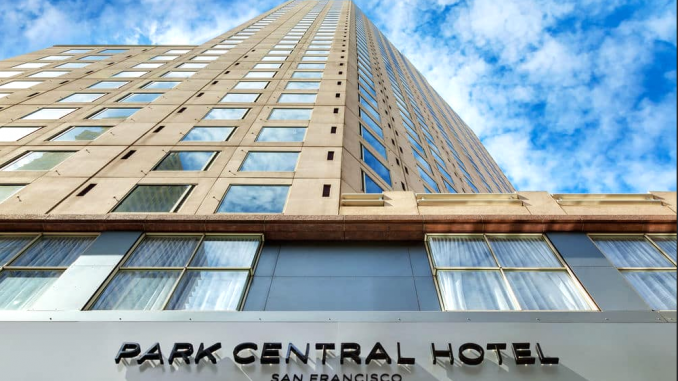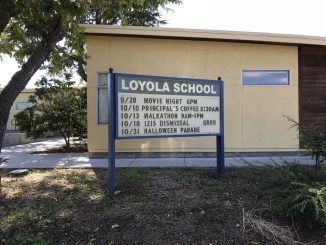
BY ALLISON LEVITSKY
Daily Post Staff Writer
Top officials at the Palo Alto, Mountain View Whisman and Los Altos school districts stayed in a San Francisco hotel on the taxpayers’ dime, a regular practice that has earned sharp criticism from Palo Alto school board Vice President Todd Collins.
Every autumn the school boards attend the California School Boards Association education conference and trade show, which last year was held at the Moscone Center in San Francisco from Nov. 29 to Dec. 1.
It’s the only conference the board members attend each year, according to trustees on the Palo Alto and Mountain View Whisman school boards. Several board members defended the reimbursement as a way to make it affordable to serve in public office.
Palo Alto school district Superintendent Don Austin and Palo Alto school board President Jennifer DiBrienza and trustee Melissa Baten Caswell all stayed at the Park Central Hotel, a four-star hotel where rooms range from $132 to upwards of $500 a night, using public funds.
DiBrienza said that trustee Ken Dauber only attended one day of the conference, so she doesn’t think he stayed in the hotel.
Newly elected Palo Alto school board member Shounak Dharap said he would have liked to stay at the hotel, but drove home at night because he wasn’t sure whether the district would reimburse for a hotel stay.
Los Altos school board member Vladimir Ivanovic and Mountain View Whisman school board Vice President Jose Gutierrez said their respective school districts also cover the cost of lodging during the conference, including when the event is held in San Francisco.
36 miles from Palo Alto
Collins, meanwhile, went for one day of the conference and said he would “never” stay in a hotel in San Francisco, since it’s only 36 miles from Palo Alto.
He raised his concerns for the first time as a newly elected board member in 2016 when someone at the district made a hotel reservation for him to attend the conference in San Francisco.
“I was like, ‘I’m not going to stay in any freaking hotel in San Francisco,'” Collins told the Post. “‘God, I mean, don’t we have a policy that says 50 miles? Isn’t that kind of close for an overnight stay?'”
In 2017, Collins was the only Palo Alto school board member who didn’t attend the CSBA conference in San Diego, where the district covered airfare in addition to hotel and the conference’s $400-per-person ticket.
“I don’t think it’s a good use of funds,” Collins said.
The conference includes learning sessions on topics such as attendance rules, math placement policies and legal fees, a trade show for vendors that sell to school districts and networking events hosted by lawyers, consultants and accountants who provide free drinks to attendees.
Collins said he avoids those networking events because “they horrify me.”
“If you go to them, you should be declaring them as vendor gifts,” Collins said. “I’m happy to deal with vendors in a professional context, but I don’t think I need to go to drinks with them.”
Trip seen as a bonding opportunity for elected board members
The event also serves as an annual bonding opportunity for board members, who go out to dinner at a restaurant where the state open meetings law prohibits them from discussing district business.
The Mountain View Whisman school board members get a daily food allowance of around $25, Gutierrez said.
Ivanovic said the Los Altos school board’s group dinner was also covered by the district.
After Collins raised concerns and suggested the Palo Alto school board have a potluck at someone’s house sometime instead of paying for a meal out, Austin and the school board chose to pay for their own dinners at the $28-a-pot restaurant Fondue Cowboy in the South of Market district.
“It’s a little weird as a bonding opportunity, since by definition you cannot talk about school affairs,” Collins said. “Why would we want to spend a lot of time and money doing that? I’d rather have (the board) over to my house.”
Board policy says minimize the expense
The Palo Alto school board policy calls for the superintendent to “establish rules to keep such expenses to a minimum while affording employees a reasonable level of safety and convenience.”
Collins said he had urged the last superintendent, Max McGee, to set rules on this, but “could never get a straight answer” out of him. He’s urged Austin to do the same, but Austin hasn’t done so yet.
“We only have one event like this per year, so it has not been a rush. It will first involve a discussion,” Austin said. “It doesn’t appear that board approval will be necessary. That aside, I want the perspective of our members.”
Stanford University and the Los Angeles school district only reimburse for hotel or meal reimbursement if the conference is more than 45 to 50 miles away.
Los Angeles Unified also allows for case-by-case exceptions in case an attendee is “required” to be at a conference or convention late in the evening and early the next morning.
DiBrienza said that was why she thought the district paying for a hotel in San Francisco during the conference was reasonable. The board dinner lasted until around 9:30 and a reception another night ended around 10. Breakfast sessions start as early as 7:30, she said.
Some board members defend the trip’s value
She and others defended the reimbursement as a way to make it possible for board members to attend the conference without having to pay out of pocket.
“I don’t like the precedent of asking school board members or any employees to go to a conference that is good for professional development and asking them to pay for it,” DiBrienza said.
Baten Caswell agreed, and said that covering expenses related to the conference was an important way to encourage board members to attend.
Dharap, a 28-year-old attorney, said he supports judicious spending, but sees the reimbursement policy as a way to lower the financial barrier to entry to serving on the board.
“Personally, a hotel room overnight in the city is not something that I can just pay for left and right,” Dharap said. “We’re planning for a family. We just moved into a house in Palo Alto. I’m a young professional. I can’t be spending money on a hotel room whenever there’s some event that I need to be at to become a better and more effective board member.”
Gutierrez, a paralegal, said he skipped last year’s conference in San Francisco because he couldn’t take the time off work, but said he sees the reimbursement policy as reasonable.
“If you can afford to pay your own way, more power to you,” Gutierrez said. “Not all of us can afford to pay for a trip somewhere.”




The way that those school board members spent much the money is similar to the corruption. Waste of money that is just for conferences in SF is wrongdoing and misconduct and ashamed.
Just to put this into context:
The standard government rate for a hotel room in SF for November/December 2019 is a maximum of $247/night. Trustees should be eligible, as they are on local government business.
Asking them to drive back and forth is approximately $40/day (2019 mileage reimbursement rate is .58/mile).
It is up to the reader how they value the time of their trustees, and whether this is a mountain or a molehill.
I would argue that PAUSD regularly blows far greater sums of money on far less justifiable endeavors.
What ever
Thank you Allison and the Daily Post for writing this story. Bravo to Todd Collins. When the board cancels a worthwhile program due to a lack of funds, we can bring up this story and ask them to cut back on their travel to help the kids. The Post is the only paper that would report something like this. The other paper is too busy protecting a certain board member.
If board members spend this freely, I wonder how their school administrators behave. Is there any oversight and/or independent audit of expenditures?